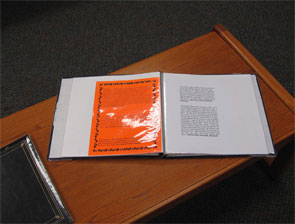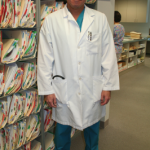When the patient returns the form, say “Thank you” and explain what to expect next. “Patients should not have to wonder what your procedures are, especially when they are new to the office,” Ramsey says. “Keep patients apprised of approximate wait times. If you expect a long delay, ask the patient if he or she would prefer to reschedule. Some offices post wait times, which is very helpful.”
Dr. Wei also emphasizes the importance of making eye contact. “With the proliferation of electronic medical systems, all too often your eyes are glued to a computer monitor and you never look up—which is a huge mistake,” he says. “Patients crave eye contact and the intimacy that comes with personal interaction.”

Patients can read testimonials about their physicians from other patients in this handy notebook.
courtesy Nathan Wei
Attention to Detail
The little things that you and your staff do will make a lasting impression. Pain Therapy Associates offers fat pens for patients to use, because they are easier to grasp. Doors have handles, not knobs that are hard to turn. Patients wear comfy gowns, not paper ones.
Ramsey advises prepping staff on appropriate office attire. “Some may need to wear uniforms, but may have to be reminded to keep their uniforms clean, neat and pressed,” she says. “Provide guidelines to staff members who do not wear uniforms. Enforce dress codes.”
Dr. Wei’s entire staff wears teal or mauve scrubs—the practice’s colors—for a uniform look, as well as name tags.
Focus on the Patient
“We try to make this experience as pleasant as possible,” Dr. Wei concludes. “When someone has a rheumatoid condition, he or she is often hurting. The last thing we want is for the patient to hurt more, either physically or emotionally.” Keep these things in mind when striving to make your practice a safe haven for patients.
Words to Practice By
Carey Dachman, MD, FACR, DAAPM, medical director, Pain Therapy Associates Ltd., Schaumburg, Ill., shares his practice’s philosophy regarding patients.
- Our patients are the most important people.
- Our patients are not dependent on us; we are dependent on them.
- Our patients are not an interruption of our daily schedule; they are the purpose of it. We have an opportunity to be of service to them.
- Our patients are not outsiders to our practice; they are our practice.
- Our patients are not names on file cards or ledger sheets; they are human, with feelings and emotions like our own.
- Our patients are not to be argued with; nobody ever won an argument with a patient.


